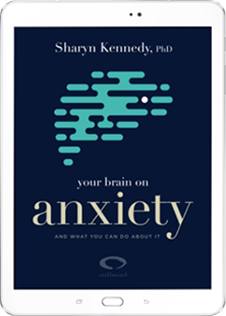This website uses cookies so that we can provide you with the best user experience possible. Cookie information is stored in your browser and performs functions such as recognising you when you return to our website and helping our team to understand which sections of the website you find most interesting and useful.
You are OK. You are not powerless.
 - Dr. Sharyn Kennedy, PhD
- Dr. Sharyn Kennedy, PhD
What Are the Symptoms of Anxiety?
Anxiety is not simple. The symptoms of anxiety include an extensive array of thoughts, feelings, behaviors, and bodily responses. On this page, we’re going to look at some symptoms that either are indicators of anxiety or are often thought to be.
As we do this, I want you to remember two things.
You Are OK
You’re not broken. You’re not a freak. You’re not weak. You’re not a coward. Anxiety is normal and universal, but sometimes it comes on strong enough that it affects the way we live our lives. When that happens, it’s time to make some changes.
You’re Not Powerless
One of the most prevalent symptoms of anxiety is a feeling of powerlessness. It can feel like nothing you ever do makes a difference and that you’ll feel this bad forever.
Your brain is lying to you. When you feel this way, it’s because your brain has a habitual response to certain stressful situations. It responds this way because that’s all it knows how to do. If you train it to react differently, you’ll think, feel, and act differently. It will change your life.
Physical Symptoms of Anxiety
Anxiety has certain common physical symptoms. If you have any of these frequently, you should consider consulting a professional.
Look at Your Body For:
- Breathing Difficulties
- Feeling Faint or Dizzy
- Dry Mouth or Lump in Throat
- Trembling or Feeling Shaky or Sweaty
- Pounding Heart
- Frequent Headaches
- Muscular Pain in Limbs
- Bowel Problems
- Tingling or Numbness
- Clenching of Fists
Look in Your Body For:
- Heaviness or Burdening Sensation
- Tightness or Tension
- Nausea
- Burning Sensation
- Spaced Out Feeling or Inability to Concentrate
- Doom and Gloom Heaviness
- A Sense of Being Stuck
Thought Symptoms of Anxiety
Stressful situations often trigger negative thoughts that trigger coping mechanisms that trigger more negative thoughts and result in a negative feedback loop. Breaking out of that feedback loop is difficult, so if you can identify and interrupt these thoughts upfront, you can change your life.
Look Inside Your Head For
- Fear of Criticism or Disapproval
- Difficulty Concentrating
- Fear of Being Isolated or Abandoned
- Scary Daydreams
- Racing Thoughts
- Overthinking and Overanalysis
- Catastrophic Thoughts
- Endless Worrying
- Fear that Something Terrible will Happen
- Feeling Out of Control
Behavioral Symptoms of Anxiety
One of the most common ways of dealing with anxiety is simple avoidance. We go to great lengths to avoid the people and situations that cause our anxiety. Avoidance can manifest in several seemingly contradictory ways. Seeking company and avoiding company are both extremely common, for example.
This is not how you get rid of the pain. This is running away from the trigger while neglecting the root cause.
Are You Asking "Do I Have an Anxiety Disorder?"
I mentioned up front that anxiety is not simple. Knowing whether you have anxiety is not simple, but you don't have to know you have anxiety to seek help. This post puts it in simpler terms and ends with a very simple question that will help you decide if help is right for you.




